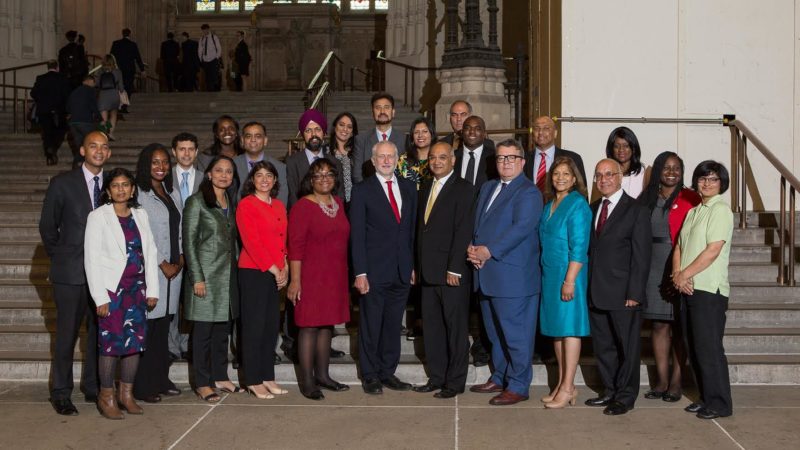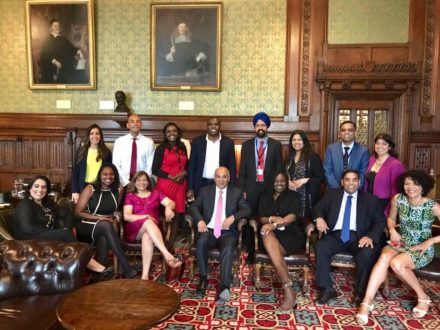

On 11 June 1987 the face of parliament changed with the election of Diane Abbott, Paul Boateng, Keith Vaz and Bernie Grant. The election was the result of the growing influence of Black Sections, at that time not formally recognised by the party, and the growing appetite of party members and black activists for greater representation.
This was a journey that had begun with the Black Power movement of the 1960s and continued with the trade union and grassroots community response to the impact of Thatcherism in the 1980s around cuts to public services, the poll tax, the miners’ strike, institutionalised racism, stop and search and a growing race and class divide. We also have to remember the impact of campaigns such against Anti-Apartheid, the neoliberal policies of the World Bank and the IMF, the implementation of anti-racism policies in local government and the success of Rock against Racism.
There was also in the 1980s a growing and powerful network of BAME councillors and council leaders. The GLC, too, furthered the cause by adopting anti-racist strategies and programmes to addresses aspects of racism and historical inequality. It is no coincidence that 1987 was also the year when Black History Month was established in this country.
These forces propelled the rise of black and white activism in the Labour party, the trade union movement and in community action. Nevertheless, the journey of black representation has been fraught with difficulties. Many in the black community dared to hope, in the early days, that the four MPs, along with the sole black peer in the House of Lords, Lord David Pitt, would bring about a ‘black caucus’ with similarities to the Congressional Black Caucus in the US, for a unified cross-party approach on black politics and social policy. Sadly, the Parliamentary Black Caucus did not last long, which in many ways has been one of the factors in the slow progress of black representation. In addition, Black Sections subsequently became the Black Socialist Society and then BAME Labour, and has not, in the past 30 years, fully achieved its aim of advancing the needs and aspirations of BAME party members and in the wider community. Along with the growth of more than 40 Friends Groups within the party, this has fractured the definition and collective cause of being “Politically Black”, a clear distinction that was developed in the 1960s by various Black Panther organisations as a way of unifying a collective approach to tackling racism in the party and wider society. Thirty years on, the BAME label has become part of the problem rather than the solution and it often feels as if the party, along with different BAME factions, is slipping back to an approach whereby assumptions about “block votes” still feature in its processes.
Although we now have, after the 8 June general election, more than 51 BAME MPs, there is still a lack of representation of African and Caribbean communities, the Labour party not having selected any new black male or any Turkish, Kurdish, Cypriot or Chinese candidates for the election.
Apart from Vaughan Gething in Wales and a few other elected officials, we had to wait until 2016, with the election of Marvin Rees as mayor of Bristol and Sadiq Khan in London, for senior representation in regional government. Much of local and regional government is still pale and male.
As we reflect on the incremental growth of black representation I am reminded of the words of Keith Vaz, in the foreword to the book he editied, Rainbow Over Westminster — A Who’s Who of BAME MPs and Peers from 1840 to 2013, in which he said: “I look forward to seeing the next black, Asian and minority-ethnic generation take their places in Parliament. I believe this generation will be a golden one, ready to build on and expand the success of the past and the present.”
It is important that we recognise the achievements of the early MPs as part of the genealogy of black representation and influencing aspects of social policy, particularly the work of Abbott on education and women, and Grant on Europe, stop and search and reparation. However, only Abbott and Vaz are still active in frontline politics, with Boateng in the House of Lords and Bernie Grant having died in 2000.
Many people will have different takes on their legacy but history shows clearly that Diane was the first black woman to be an MP and Keith was only the second Asian MP. Despite their achievements, Diane received unprecedented levels of racism and Afriphobic attacks by the press and the Tory party in the recent general election. This clearly showed that as a party and in wider society we need to do more work on tackling Afriphobia, Islamophobia and Anti-Semitism if we want to promote and support a new generation of politicians, especially those young people who joined the party over the past two years as result of the vision and leadership of Jeremy Corbyn.
Patrick Vernon OBE is a trustee of the Bernie Grant Trust and chair of Labour’s Race Equality Advisory Group.
The Bernie Grant Trust plans later this year to celebrate 30 years of black political representation.




More from LabourList
Ashley Dalton resigns as health minister for cancer treatment
Paul Nowak column: ‘Labour must focus on the basics’
‘Labour’s two-child cap victory rings hollow while asylum-seeking children remain in poverty’